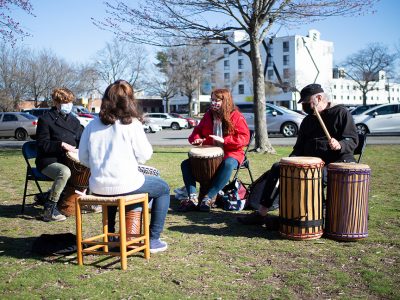The banks of the Charles River were kept alive by the heartbeat of djembe drums Tuesday afternoon — tying the soft rattling of bicycle spokes, the cries and laughter of children and the muffled ring of a rowing instructor’s megaphone into a new, strikingly normal spring symphony.

Alan Tauber, director of Arlington-based DrumConnection, led a group of three — two students and one student-teacher — in traditional tempos near the Artesani Playground in Lower Allston. Masked and distanced, they beat away with hands and sticks and tapped their feet.
Several times, the group paused as he pounded a new rhythm for them to try.
“I studied with the original guy who brought it here, so I want it to be at least a little authentic,” Tauber told the group. “The problem is the history doesn’t say that it’s supposed to be rigid, firm or only one way.”
All four members of the group had already been fully vaccinated. Two removed their masks as they spoke about how things felt somewhat normal.
Partway through the set, a mother invited her daughter to dance before they resumed their walk. Tauber gave them a light drumroll and a wink, the others gave smiles while they kept time.
At 67, Tauber has been teaching drummers in the Boston area since the 1980s, he said.
Tauber said he usually runs in-person lessons out of adult education centers around the city, but classes went remote when the pandemic took hold. Although classes were able to continue, he said they were occasionally hindered by the distance and technical difficulties.
“It caused people to feel that they were disconnected from drumming,” Tauber said. “When the microphones feel that big, loud sound out of nowhere … that mic has a built-in processor that cuts out the sound.”
He added that the group kept up outdoor drum circles alongside virtual classes until the weather began to cool in October of 2020. Crowds ranged from three to 30 participants, Tauber said.
DrumConnection’s circles hibernated over winter before returning to the riverbank March 23, Tauber said. Since then, it has convened four times.
At Tuesday’s circle, participants alternated between learning traditional rhythms — copying Tauber’s movements — and improvising their own in time.
“Learning doesn’t have to happen out of a book, it definitely doesn’t have to happen by someone telling someone what to do,” Tauber said. “It can happen just by someone showing you, so you can hear it and see it.”
Tauber added that the site along the river was one of several local spots he first learned to drum more than four decades ago.
“We still go to that same place,” he said, “that hallowed ground.”
Christine Stevens, an Arlington resident who attended Tuesday’s drum circle, said she first attended one of Tauber’s lessons in Lexington before the pandemic, having not drummed prior.
A life-long lover of music, especially rock ‘n’ roll, she said drumming was a great fit.
“It was great,” Stevens said. “Then COVID started, and that was the end of drumming for me.”
Stevens said when she heard about the riverside drum circle, she saw it as a chance to “get back into it.”
“It’s getting back into the world,” she said. “It’s very freeing. All of your problems go away and you just focus on something. It’s very meditative.”
A 2018 study by researchers at the Royal College of Music and the Faculty of Medicine at Imperial College London found that those who participated in community drumming reported a general sense of uplift, greater feelings of personal agency and heightened feelings of connectedness to their group.
Tauber said it can take time for students to become technically skilled enough to express their feelings through the rhythm, but participants often improve within the time of one lesson.
“Their eyes close,” Tauber said. “They sort of go inside themselves a bit, and it takes them inside to their feelings.”


















































































































